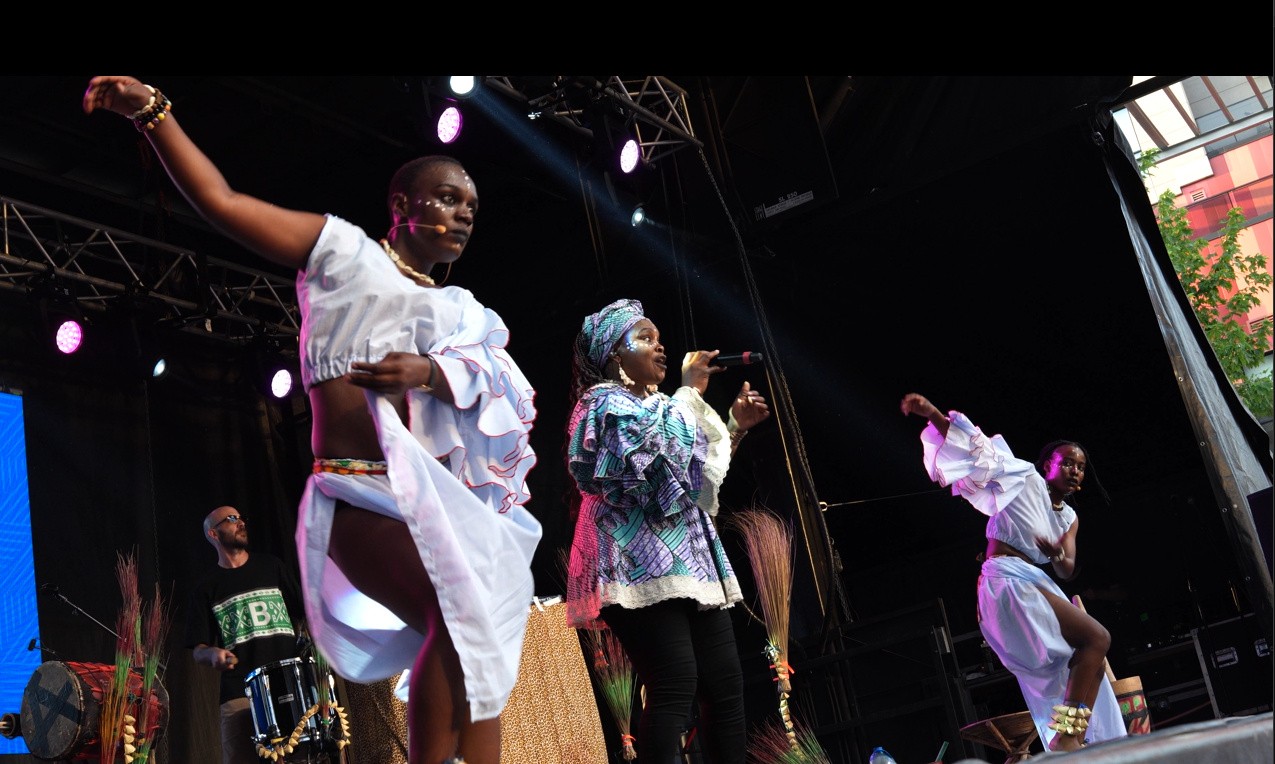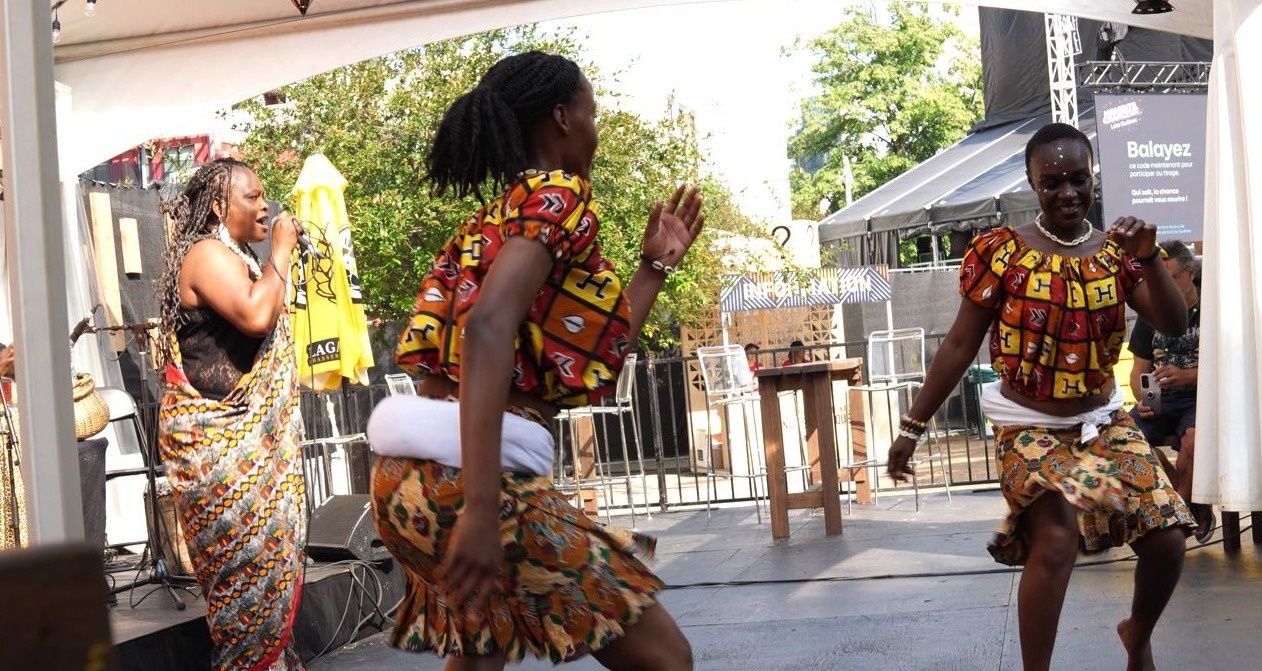In 2018, Gladys Samba, also known as Mama Gladys, created a music group to, as she puts it, defend women’s rights in the city of Brazaville, Congo. On stage, the artists use kitchen tools such as pestles, spoons, forks, baskets, and repurposed objects as a nod to the domestic tasks traditionally assigned to women. We caught up with them the day before their show at the Festival International Nuits d’Afrique (The International African Nights Festival) to ask about the group’s mission.
Tuesday, July 15. Under the shining sun, we meet five members of the group: Gladys, founder and lead singer; Zuangui and Penina, the dancers; and two men, Mel and Robin, the percussionists and music mixers. Their hotel is just steps away from Montreal’s Quartier des spectacles. Their luggage and instruments are still at the front desk of said hotel as they’ve just arrived from Quebec City, where their concert was canceled due to thunderstorms.
We settle in the hotel garden. The artists sit in the chairs we’ve moved around, and the fatigue from their busy past few days is palpable, worsened by the heat. The love and pride Gladys feels for her roots are visible on her wrist: a gold-colored pendant shaped like the African continent hangs from her bracelet. When the others talk about the group’s founder, they all call her mama, out of respect.
“Congolese tradition teaches that when a woman turns 18—whether she has children or not—she’s already a mother, because she’s a mother in the making,” Gladys explains. “You have to say ma before her name. And once you pass 40, you say mama.” The same rule applies to men, with ta added in front of their names.
“We’re just looking for balance”
Around her neck, Gladys wears a large necklace made of cowrie shells, and her head is wrapped in a navy blue and orange scarf. Music has been part of her life since childhood. “I always knew deep down that music would be my passion and that it would become my job, even though my parents didn’t want that,” she says. “When you grow up in our towns and villages, there’s music everywhere. When you wake up, you hear the local guy making music to sell his beer! Music is something you’re born with and you die with.”
She shares what led her to create Les Mamans du Congo: “[Back then], mothers weren’t allowed to speak in public,” she explains. Behind her, Mel nods in agreement. “Women had to stay home, in the kitchen, taking care of the kids. But with the freedom of expression we have as artists, I asked myself why not talk about that in our songs, in our performances, to get the message across?”
Robin, sitting to her right, listens intently, arms crossed over a black sweater with multicolored stripes.
Women’s empowerment and work as a means of liberation are topics close to Gladys’s heart. Still, she doesn’t identify with the feminist label. What the group aims for is to spread a message of equality for women in her home country.
“Women’s empowerment goes hand in hand with tradition,” she insists, raising a finger in the air. “You have to know your roots to modernize them. You can’t just jump into modernity and leave the past behind,” she says, her brows furrowed. “Where is your foundation? To build a house, you need a foundation. And for us, our foundation is our tradition.”

The use of kitchen tools in the group is far from random, too. "That’s our symbol of resistance,” Gladys says. Robin and Zuangui nod in agreement. “[A woman] can do more than just laundry, dishes... and looking after the home.”
Gladys is glad to see more women speaking out about the injustices they face. She mentions the collective Tosala, made up of 18 artists, founded in 2021 to raise awareness about women’s rights. She’s also committed to keeping the elders’ legacy alive, to ensure it doesn’t vanish, “to prepare the next generation,” she explains.
“Every lullaby we have has value. It’s not just to help children fall asleep. Some of them help kids grow, they give them phrases to hum as they start learning to speak,” says Gladys, pointing to her ear. “In our culture,” she continues, “when a woman gives birth, as soon as she returns home, there are traditional songs. People come and sing for the baby. So you hear music from the moment you’re born. People sing for you.”
Proud to Be Part of Les Mamans du Congo
Zuangui joined the group in 2022. She was 19 when Gladys took her under her wing. At first, the founder hesitated to include her since she wasn’t a mother at that time.
“I went to see her parents to ask for permission [for her to join the group]… I met her mom, her dad, her brothers, and they asked what we do in the group. And as soon as I started talking about women’s rights, the first person to show interest was her father!” Zuangui lowers her head and lets out a laugh. “Her dad told me, ‘Take the girl, I’m giving her to you! Because this is very important for our society.’”
“With everything happening in our country,” Zuangui adds, “I feel like we have to stand up for this. It’s high time we, the youth,” she says, pointing to herself, “get involved in the situation (…)”
Penina, the group’s other dancer, joined in 2020. She was 26 at the time. “At first, my parents didn’t want me to do it, but I wanted to follow my heart. In the end, I gave it my all. [In our] country, you can’t do two things at once. For us, a woman’s place is in the kitchen, but I told myself that we have to stand up for ourselves,” says Penina. Today, she says, her family is proud of her. They've even gone to see the group perform many times.

Tatas (dads) amongst the mamas (moms)
Two men sit beside the three women: Mel and Robin. Mel, in a blue shirt and tied-back locks, is the group’s percussionist. Robin, sitting at an angle, is both percussionist and a musical mixer. Mel acknowledges the challenges Congolese women face.
“When I see the Mamans, I think of my own mom,” he says. “I remember the dynamic between her and my dad… We need balance,” he adds, miming a scale with his hands. “It’s embarrassing to see how men always want to be on top. We’re different, and we each have something the other doesn’t.”
Robin talks about his relationship with his two young sons, and how men also play a role in shaping how women are perceived by the next generation, he notes.
“We can’t just turn a blind eye and say, ‘That’s not our job, that’s the mom’s job,’” he says firmly.
After nearly an hour of conversation, the interview wraps up. Mel sends some love to Zuangui and Penina: “They seem shy, but on stage, you wouldn’t recognize them.”
Everyone stands up, ready to recharge before their big performance for the next day.




.jpeg)